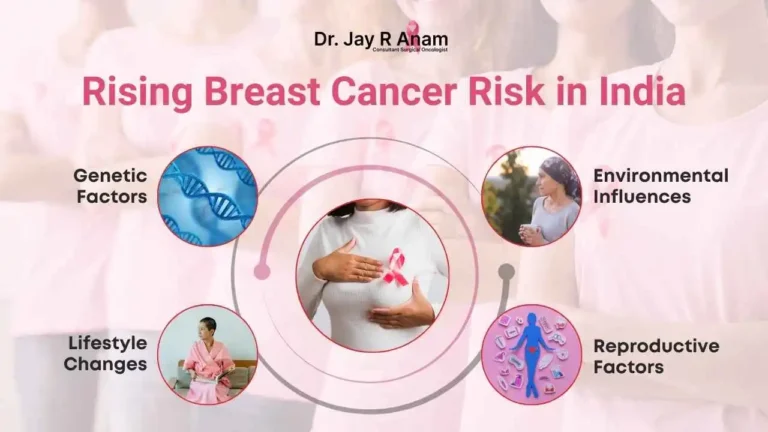In India’s urban centers, changing lifestyles and delayed pregnancies are reshaping cancer trends, with breast cancer increasingly being diagnosed in younger women. This shift is particularly evident in metros like Mumbai, where access to specialists such as a Breast Cancer Surgeon in Mumbai has become essential for timely diagnosis and advanced treatment. What makes this trend alarming is that younger women often present with more aggressive disease, requiring not just surgical expertise but a comprehensive approach to survivorship that acknowledges the unique challenges of this age group.
Why Younger Women Are at Risk
Traditionally, breast cancer was considered a disease of older women. However, data from Indian registries show that women in their 30s and even late 20s are increasingly being diagnosed. The reasons are multifactorial: delayed childbearing, hormonal influences from lifestyle changes, rising obesity rates, and a lack of regular screening.
In Mumbai, where high-pressure careers often delay marriage and childbirth, these factors converge. Younger women may also dismiss early signs like a lump or pain as benign, leading to late-stage diagnoses. This makes the role of awareness campaigns and early intervention even more critical in the city.
The Complexities of Treating Young Patients
Treating breast cancer in younger women is not the same as treating it in older age groups. Tumors tend to be more aggressive, requiring stronger treatment regimens. At the same time, these women face unique concerns: fertility preservation, body image, and long-term hormonal changes.
Surgical decisions, for instance, must balance oncological safety with cosmetic outcomes, as younger patients often have decades of life ahead of them. Breast-conserving surgery combined with reconstruction is therefore prioritized in many Mumbai hospitals, ensuring both disease control and quality of life.
Fertility and the Future
One of the most emotionally challenging aspects of breast cancer in younger women is the impact on fertility. Chemotherapy and radiation can affect ovarian reserves, sometimes permanently. Mumbai’s oncology units are now collaborating with fertility specialists to offer options like egg or embryo freezing before treatment begins.
This intersection of oncology and reproductive medicine ensures that women can look forward to motherhood even after cancer. It reflects a larger trend in Indian oncology: treatment is no longer just about survival, but about preserving the future patients dream of.
Survivorship and Lifestyle Rebuilding
Life after breast cancer for younger women involves more than routine check-ups. Many struggle with fatigue, hormonal fluctuations, and the psychological scars of their diagnosis. Here, lifestyle rebuilding becomes a key part of survivorship.
Exercise, balanced nutrition, and mental health support help patients transition from treatment to normal life. The motivation to adopt these changes parallels broader wellness journeys, much like the themes discussed in how to stay motivated on your fitness journey. For many survivors, cancer becomes a turning point that inspires them to prioritize health in ways they had never considered before.
The Psychological Toll of Early Diagnosis
For younger women, a diagnosis of breast cancer often feels like an unfair interruption to life’s plans whether that means marriage, career, or starting a family. The psychological burden can be immense, with higher rates of anxiety and depression compared to older patients.
In Mumbai, where the pace of life is relentless, hospitals are increasingly offering counseling and support groups tailored to young patients. Sharing experiences with peers who understand their journey helps women rebuild confidence and redefine their identity beyond cancer.
The Role of Precision Medicine
Genetic testing plays a significant role in younger patients. Mutations like BRCA1 and BRCA2 are more commonly implicated in early-onset breast cancer, and identifying them not only guides treatment but also informs family members about their own risks.
Precision medicine, whether through targeted therapies or immunotherapy is becoming part of standard care in Mumbai’s leading oncology centers. This integration ensures that treatment is both aggressive enough to control the disease and personalized to the patient’s unique biology.
Economic and Social Barriers
Despite the progress, barriers remain. Many young women hesitate to seek help due to financial constraints, fear of social stigma, or lack of family support. In a city as diverse as Mumbai, the divide between those who can access world-class care and those who cannot is stark.
NGOs and government programs are stepping in to bridge this gap, offering screening camps, subsidized treatments, and awareness drives. The involvement of community organizations ensures that solutions are not limited to hospitals but reach women where they live and work.
Looking Ahead: Building a Survivor-Centric Model
The future of breast cancer care in Mumbai lies in survivor-centric models. These models extend care beyond the hospital walls, integrating long-term follow-ups, lifestyle guidance, and fertility counseling into oncology practice. Technology will play a role too—mobile apps for survivorship tracking, AI for early detection, and telemedicine for continuous support.
By placing survivors at the center of oncology care, Mumbai is creating a blueprint for other cities in India to follow. The ultimate goal is not only survival but also a meaningful, empowered life after treatment.
Conclusion
Breast cancer among younger women in Mumbai is a growing challenge, demanding specialized surgical expertise, fertility preservation, psychological care, and survivor-focused rehabilitation. For patients who turn to a Breast Cancer Surgeon in Mumbai, the journey today is about much more than removing a tumor, it’s about navigating an entire life stage disrupted by cancer.
Just like maintaining motivation in a fitness journey requires discipline and resilience, surviving breast cancer in youth demands strength, consistent care, and support at every step. Mumbai’s oncology landscape is rising to this challenge, redefining cancer treatment not just as a fight for survival, but as a pathway toward a renewed, fuller life.

